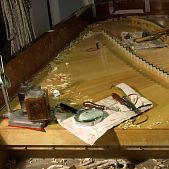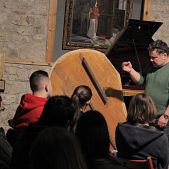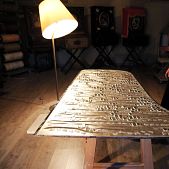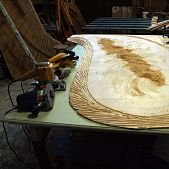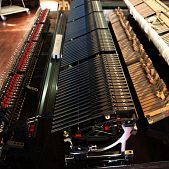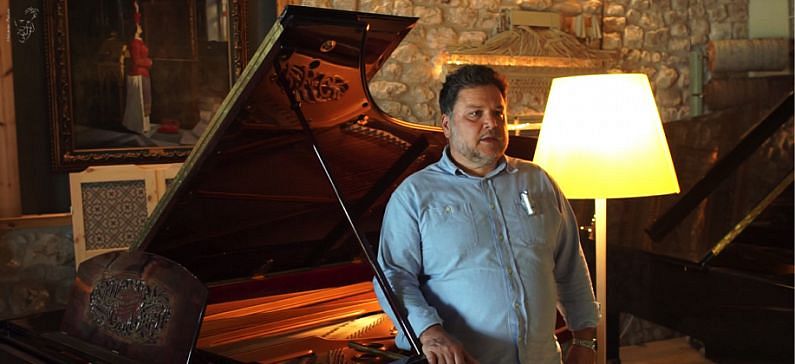
One of the best piano makers in the world
Panos Ioannidis is one of the world’s best piano makers, as well as one of the few who adjusts pianos to each pianist’s hands in terms of music and aesthetics. In his workshop, some of the best pianos worldwide are made, with know-how, a result of 40 years of experience, and with great love for music.
Panos Ioannidis is an instrument maker with three parallel activities, those of the piano songwriter, the barrel organ maker and the piano-with-tail reconstructor. Ioannidis pianos can be found in large halls and Conservatories all over Greece, in music houses, in Germany, Turkey and Russia.
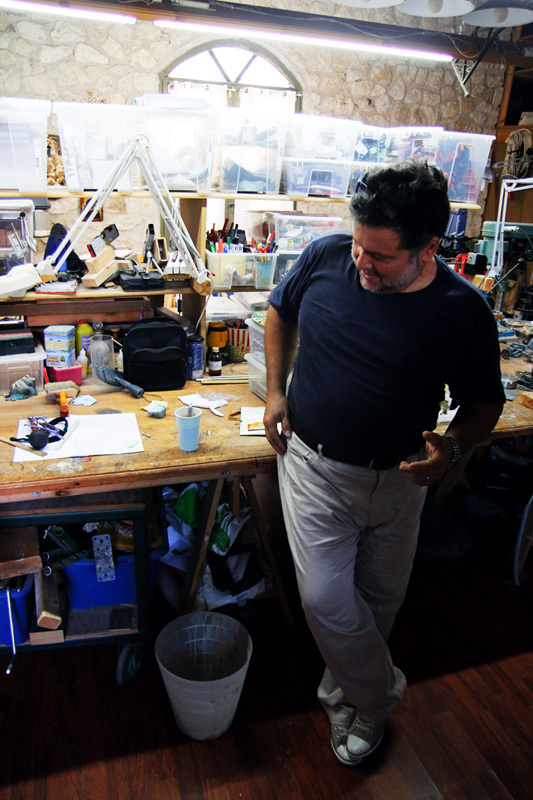
Since he was a child, he considered that those who were involved in the construction of musical instruments did something very important, as this process brings together culture, art and science, as Mr. Ioannides has said. He graduated from Leicester’s Polytechnic in England in 1979 as a BSc Hon Degree engineer in order to follow his father’s professional path, but in the process, his plans changed. He kept thinking about the magic he saw in the construction of musical instruments. He chose to be engaged with something that would be as close as possible to their construction and at the same time secure his livelihood by choosing piano tuning.
Although he did not like the piano at first, as it seemed very complicated and outrageous and he did not understand it, on the way, he slowly began to deepen in its preservation, technical features and details, discover secrets and charming parts of the work.
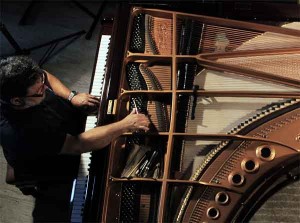
He was a piano technician in England and the United States, where he also received the Registered Piano Technician (RPT) from the Piano Technicians Guild, the world’s largest and most prestigious chorist organization. Then, he started from a conservatory school, where he was taught piano conservation, covering damage done by playing, tuning, servicing, reshuffling.
Since 1983, he has worked as a technical collaborator and conservator of the Thessaloniki State Orchestra, the Orchestra of Thessaloniki, the State Conservatory and other major conservatories of the city, the University of Macedonia and the Municipality of Thessaloniki, while making piano renovations and reconstructions.
Since 1990, he has begun research into the construction and revival of the “Greek” laterna (barrel organ) and the enrichment of its repertoire. The old barrel organs in the streets were untuned and in poor condition and in need of maintenance and new songs, but craftsmen were scarce. So, at some point, he accepted the proposal to make a new cylinder for an old barrel organ, which he had estimated it would be ready in 2-3 months, but it turned out that it took more than two years because the barrel organ is a complex mechanical construction. From this occupation, he learned all the secrets of the laterna, and since 1997 he began to make barrel organs himself. His engineering studies helped him with it.
After ten years of construction of barrel organs, his next step was to build a piano, a huge goal for a workshop because it requires great infrastructure, cost and risk. The fact that after the maintenance there was no way to gain further knowledge on the piano, he began to experiment, and after ten years of experimentation, enough cost and thousands of hours of research, he began to look for other people in the world who had done the same as him. He found production directors in piano factories, university professors or researchers who had left their researches behind.
In the first years, he spent up to 1,000 euros per day for a tutorial, but if one has nothing to give, as he says, if they aren’t arrogant and make these people see that they really care, they win them over because they have something to give in order to take, “And they also wind them over with their “craze”. Because they all have a common “craze”. Thus, you start earning years of your life, because when you go even one day to such a person, you have gathered in your basket knowledge of centuries. Because they’ve also got it from somewhere else, they’ve looked somewhere else.”

Remembering the first handmade piano he made and the moment he heard his first key playing, he says “At that moment, I felt like I put a flag on the top of Everest. And when you put the flag, you are all alone up there. No one applauds you. But when you come down from Everest and come home, you know the flag is still there. ”
The results were very encouraging and, since 2000, he has begun the construction and organization of a very large, modern, special workshop for the reconstruction of pianos and the construction of barrel organs and since 2002 he produces the “handmade piano”. His workshop, just outside Thessaloniki, in Nea Gonia, Chalkidiki, is appropriately shaped with the necessary cranes and winches so that he can handle such heavy instruments himself.
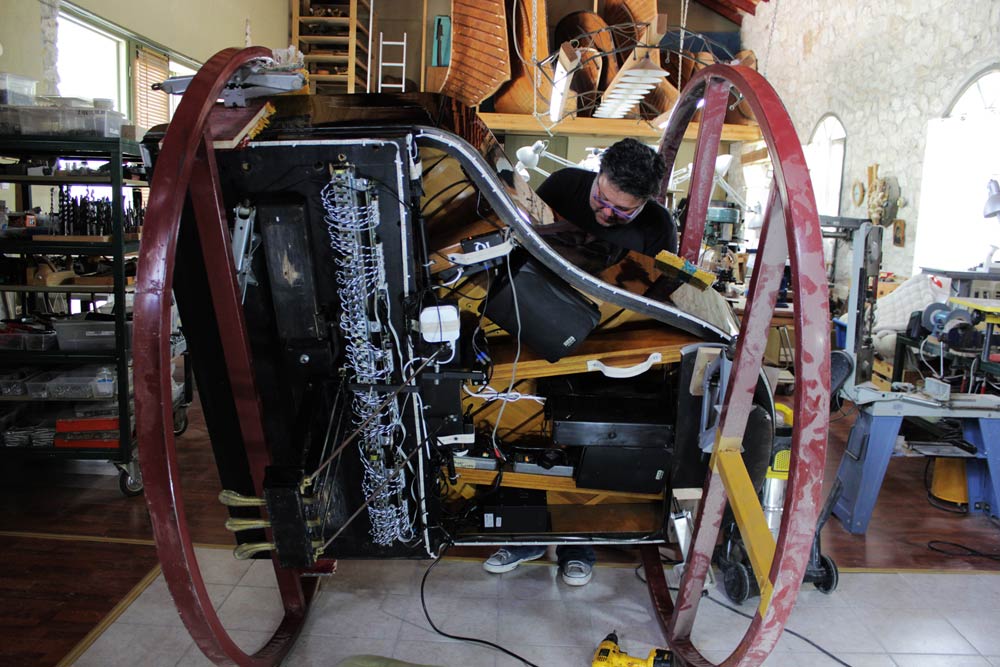
He has learned a lot from great craftsmen and now he mainly manufactures pianos, although he continues to manufacture barrel organs. “I have been enchanted by this thing we call sound. It is the brick with which we build our own house; the musical tone. There, there is much to go in to, to deepen, to explain, to discover.
“Historically, people never learned to hear musical tones, they lived by clicking, with noises, with bells, with alarms,” explains Mr. Ioannidis. “Now, they live in the century of sound and a pianist is trained as a sommelier. Only the human body can measure such a complex feeling because the piano combines two senses, hearing and touch. In the workshop, using top-quality materials, we redesign a piano with our own taste – which has changed over the decades – and we believe we are a step ahead because our results are much better than those of the commercial pianos. It’s something that wants multi-engagement, knowledge from many different specialties, you need to know how to work with metal, wood, design, math. It is very difficult, but it is also a dream. ”
Until recently, the construction of pianos was done only in large industries, but in recent years, small workshops in America, Canada and Australia and two in Europe undertake their construction according to the personality of the owner, the music they will play and their aesthetics. As Mr. Ioannidis pointed out, the piano is now more personal.
For the perfecting of a handmade piano, it takes several months and his workshop usually has special orders, which are realized by the application of a special technique, which they use in the monasteries to polish gold and platinum, while the instrument maker himself bothers a lot with its aesthetics. In such cases, it may take up to two years to complete each order.
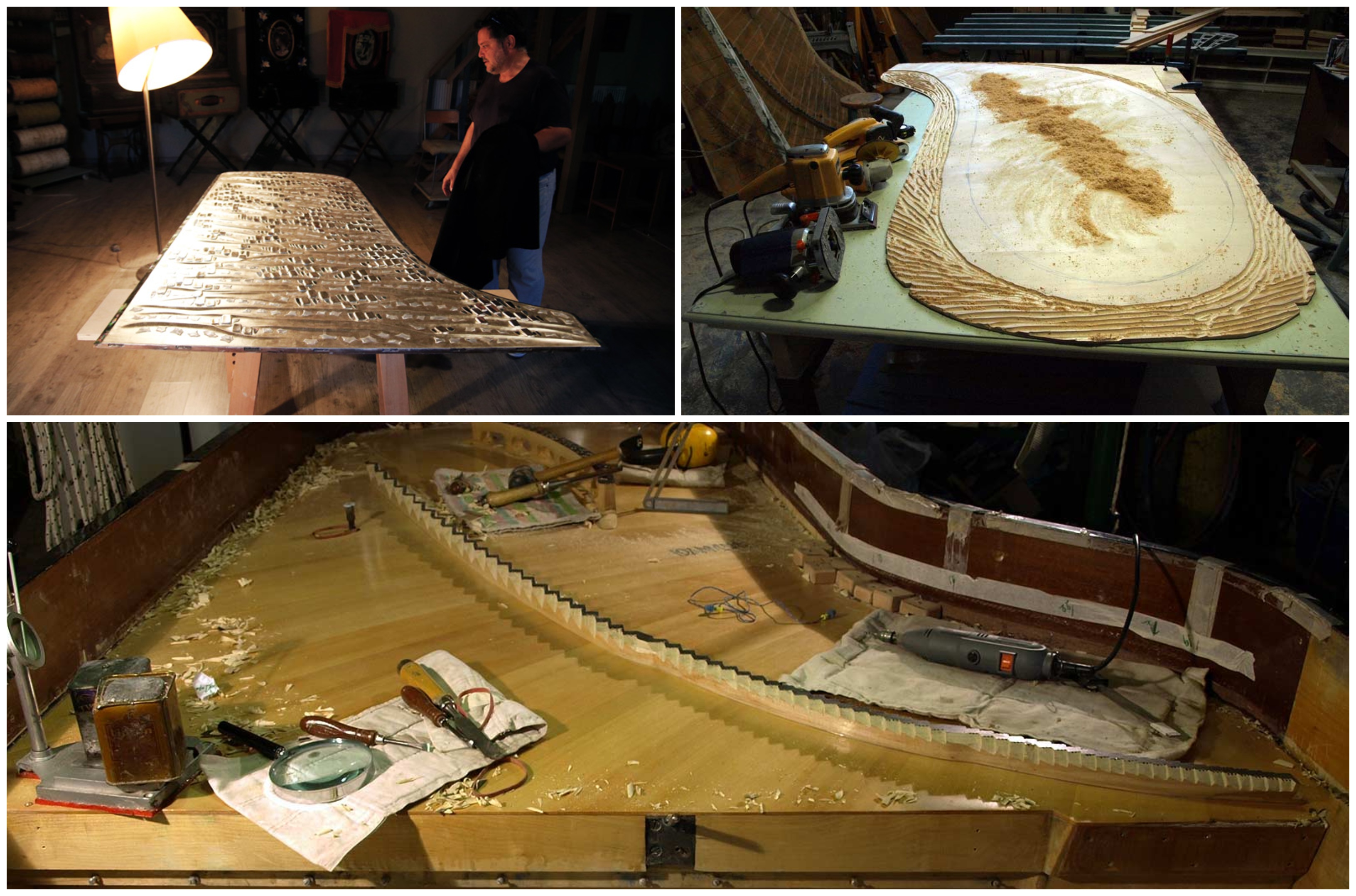
In the past, Mr. Ioannides sold an average of two pianos a year, while in the last years, he has been completing only one piano per year, with the aim of making the piano better than the previous one.
To give life to such a piano, one does not need to be a virtuoso pianist, as long as they place a digital mechanism on it, and then the piano plays on its own. In this way, the customer can enjoy the piano as a musical instrument without having to play. It’s a completely different feeling than putting on a CD, as the instrument manufacturer has explained, while with the speakers under the piano’s belly, which are not visible, the piano looks alive. Panos Ioannidis is the only one in the Balkan countries who has been certified for this digital mechanism, which he now places on all the pianos he makes.
The secret of his success, his tremendous career as a pianist and artisan is the discovery that everything in the sound is unknowing, as they are taught, “This whole process helped me understand what I’m looking for and where I want to go. All my life, I had been searching for the thing that makes an instrument sound better than another. I’ve tuned over 35,000 pianos. The subject of sound has become a new consciousness for me.”
Today, he gives seminars for acquaintance with the piano and teaches the art of the tuner while preparing a book called “Interview with a Piano”, which aims to bring the pianist closer to his piano, and a book and a CD titled “The beautiful Tatala”, which describes the musical, historical and technical journey of the barrel organ through the path of a refugee family – that of his grandmother’s.

He has released a book with a CD entitled “Laterna-The Lady of the Road” with historical and technical details of the barrel organ, as well as 18 recordings of his own barrel organs. Another edition followed, Pera Güzeli CD / DVD, a documentary that was shot in the framework of the “European Capital of Culture-Istanbul 2010”, contains songs that were sung by both peoples, Greeks and Turks, with the same melody and verse.
Mr. Ioannides does not make plans for the future, as all he wants is to continue making piano and barrel organs not with his hands but with his soul. He has taken so much through this process, as he says, that he needs nothing more.





